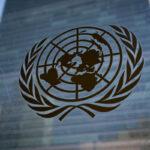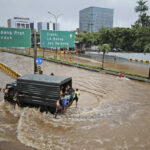
Mar. 2—GRAND FORKS — Marta Datsik, a Ukrainian foreign exchange student who attends Sacred Heart School in East Grand Forks, rose before the crowd gathered at Calvary Lutheran Church for the “Voices for Ukraine” event Tuesday, March 1.
She spoke firmly and confidently about her
country’s commitment
to driving out Russian invaders. The U.N. human rights office said Tuesday that at least 136 civilians had been killed since the hostilities began, including 13 children. Hundreds more have been injured, according to the office.
“Russia is not only shooting at the military bases, as they say in the news; they are shooting in people’s houses, schools, kindergartens,” she said.
“Who gave him the right to take away these people’s lives?”
Datsik, 16, who was among speakers who denounced the Russian aggression, said the eruption of the conflict last week was “scary,” but she is “pretty confident” that, given the actions of the army and the president, her country “is going to be alright. … People have organized in the towns, and are watching the streets.”
She is “very proud” of the Ukrainian army and President Volodymyr Zelensky, whom she called “one of the biggest heroes of our time.”
“Ukrainians just want to live peacefully as any other European country. … We will fight for (our country) ’til the end, no matter what,” she said.
While her family members, who live in Zhovkva in western Ukraine, are relatively safe, they know the situation is dangerous and have heard bombing a few kilometers away — at times, they have taken refuge in bomb shelters, said Datsik, a junior in high school.
In her homeland, “there is a very small percentage of people who are sympathetic to Russia,” she said. Ukrainian patriotism grew stronger since 2014 when the Russians invaded the country and annexed Crimea from Ukraine.
Those gathered for the Voices for Ukraine event “are representing what is right in the world,” said Terry Brenner, superintendent of the Grand Forks and Grand Forks Air Force Base school districts.
He and other speakers drew from personal experience or historical family anecdotes in their remarks at a podium draped with the blue and yellow Ukrainian flag.
“I am the second generation of a little Jewish girl who escaped the Russian revolution in 1918, and made it to Ellis Island. She found freedom, but the rest of her family was not so lucky.”
Sylvia Pullman was a child when she fled her homeland, Brenner said. She later married and became Sylvia Brenner and was Brenner’s grandmother. Tuesday, March 1, marks her 115th birthday, he said.
Brenner reminded the audience of the “human rights, dignity and peace we take for granted in the U.S.,” he said, and to imagine Ukrainian parents comforting their children “that ‘all will be OK,’ when there is distinctive doubt in our world.”
But one person can make a difference, he said. “I wouldn’t be here today if someone had not helped my grandmother escape in 1918.”
Mayor Brandon Bochenski talked about living, during his hockey career, in Kazakhstan, with “the Big Bear to the north,” and the tense times he witnessed when Russia annexed Crimea.
He read a Biblical passage, offering a prayer for Ukrainians “as they go through this horrible time” and that there will be “an end to this madness and this sadness.”
Another speaker at the event, retired District Judge Joel Medd, president of the local chapter of Germans from Russia, said his organization has “a special connection” with Ukraine.
He recalled Peter the Great’s offer of free land and freedom to Germans in 1800, if they relocated to Ukraine. When those promises were later withdrawn, 115,000 Germans living in Ukraine emigrated to America — more settled in North Dakota than in any other state, Medd said.
Tuesday’s event was “something we really needed to do to support Ukraine (where the people) have been struggling and fighting,” Medd said after the event concluded. “They have courage and the homeland on their side.”
Ukraine should be supported with financial, humanitarian and military aid from other countries, he said.
Speaking for the Germans from Russia organization, Medd said, “We support Ukrainians in their valiant fight for freedom and independence.”
Pastor Kirk Meseck, of Calvary Lutheran, said the impact of the Russian invasion has produced a “huge, deep sense of vulnerability” among those who are witnessing it.
“Think of the vulnerability” of those who are experiencing it, Meseck said, as he offered prayers to “lift up these people,” protect the children, and for Russian troops “to lay down their weapons and go back home.”
During the event, the audience also heard a stirring rendition of “You’ll Never Walk Alone,” by soloist Ryan King, and “Let There Be Peace on Earth,” sung by about 30 Kelly Elementary fifth-grade students, directed by Kathy Fiedler.
The event was particularly poignant and “very meaningful” for Donna Bott, who has family members in Ukraine, she said. “We don’t know what’s happening with them; some family members in Detroit are trying to find out. They are in Lviv, which has not been bombarded like Kyiv has.”
Bott’s parents immigrated from Ukraine in the 1920s and met and married in Winnipeg, she said.
“The Ukrainian people are doing everything they can to fight back,” she said. “Like everybody else, I hope Putin comes to his senses and draws back. But it doesn’t look like that will happen.”
Bott grew up in a nationalistic Ukrainian community in Winnipeg, where about 20% of the population trace their family roots to Ukraine, she said, proudly displaying the colors of that country’s flag, with a bright blue and yellow cap.
The conflict between Ukraine and Russia is nothing new; it has been going on for 300 years, she said. “Russia just feels it has to dominate Ukraine.”
Bott was vexed by the 1994 Budapest Memorandum, whereby Ukraine agreed to give up what amounted to the world’s third-largest nuclear arsenal in exchange for a promise from the United States, Russia and Britain “to respect the independence and sovereignty and the existing borders of Ukraine” and “to refrain from the threat or use of force” against the country.




